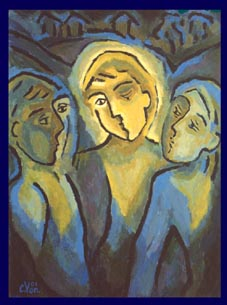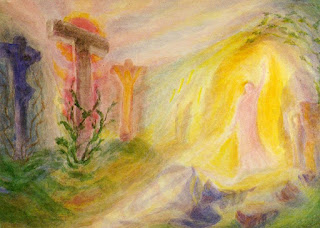2nd Sunday after Easter
 |
| Sanz-Cordona |
"Yes, the truth I say to you: Anyone who does not go into the sheep through the door, but breaks into the fold elsewhere, is a thief or robber. Only he who enters by the door is a shepherd of the sheep.
"To him, the doorkeeper opens, and the sheep respond to his voice. He calls each one by name, according to its nature, and he leads them out into the open. When he has brought them out, he walks before them, and the sheep follow after him, for they trust his voice. A stranger they will not follow, but rather flee because they do not know the stranger's voice."
Thus did Jesus reveal himself to them in pictures, but they did not understand what he was saying to them.
Then Jesus went on. "Yes, the truth out of the spirit I say to you. I AM the door to the sheep. All who came before me were thieves and robbers. But the sheep did not listen to them.
"I AM the door. Anyone who enters through me will find healing and life. He learns to cross the threshold from here to beyond, and from there to here, and he will find nourishment for his soul. The thief comes only to steal and kill and destroy. But I – I have come that they may have life, and overflowing abundance.
"I AM THE GOOD SHEPHERD. The good shepherd lays down his life for the sheep. Whoever works for wages and is no true shepherd, whose sheep are not their own, sees the wolf coming, abandons the sheep, and flees while the wolf snatches them and scatters them. For they are only hirelings and care nothing for the sheep.
"I AM THE GOOD SHEPHERD. I know who belongs to me, and my own recognize me, just as my Father recognizes me in the depths, and I know the being of the Father; and I offer my life for the sheep.
"Other sheep have been entrusted to me who are not of this fold; I must also lead them. They too will listen to my voice, and one day there will be one flock, one Shepherd."
2nd Sunday after EasterMay 1, 2022
John 10:1-21
A doorway is an opening that leads from one space to another. The door can either open or close off the access. In our everyday lives, we encounter many doors; not only the physical ones in rooms and buildings but also the portals between one state of soul and another.
One such doorway is waking and sleeping. At night we are meant to move calmly and easily through the doorway of sleep. The doorway to our earthly concerns closes behind us, and we move out into the starry pastures where our souls are nourished, and our bodies refreshed. And then, at the right time, we are called back to our earthly home.
But fear and worry, clinging to earthly concerns, can hold us back at the gateway to sleep, or bring us rushing back too soon.
At the beginning of our earthly lives, we stood before a similar portal. We were called into life, onto earthly fields. And at the end, we will be called back again to our heavenly home.
 |
| William Dyce |
So, as a ‘sleep aid’ we can say the following prayer:
Come unto me.
May I receive them
With a quiet mind
Through the Father’s ground of peace
On which we walk.
May the people who seek me
Come unto me.
May I receive them
With an understanding heart
Through the Christ’s stream of love
In which we live.
May the spirits which seek me
Come unto me.
May I receive them
With a clear soul
Through the healing Spirit’s Light
By which we see.*
And then we can awaken from the Good Shepherd’s nourishing fields of sleep, the kind of sleep that
I sleep where I will
wake with the
strength to
deeply
love….**
*Adam Bittleston, "Against Fear," in Meditative Prayers for Today. Available at https://steinerbooks.presswarehouse.com/browse/book/9781782504672/Meditative-Prayers-for-Today
**Theresa of Avila, (1515-1582), “Clarity is Freedom” in Love Poems from God, Daniel Ladinsky, p. 279






















